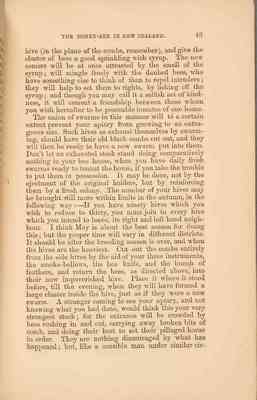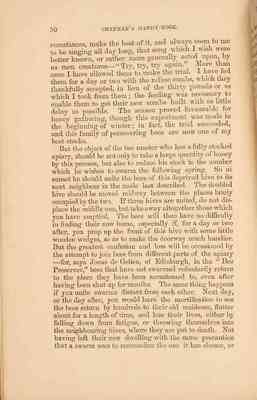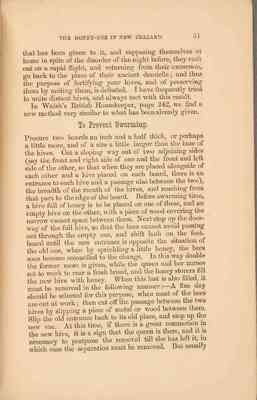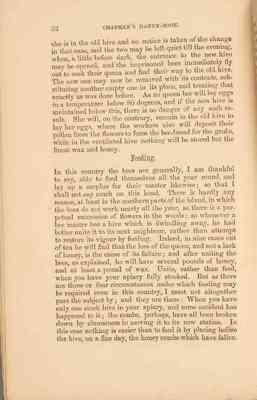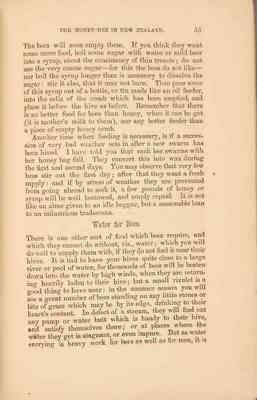Pages
THE HONEY-BEE IN NEW ZEALAND. 49
hive (in the plane of the combs, remember), and give the cluster of bees a good sprinkling with syrup. The new comers will be at once attracted by the smell of the syrup; will mingle freely with the daubed bees, who have something else to think of than to repel intruders; they will help to set them to rights, by licking off the syrup; and though you may call it a selfish act of kindness, it will cement a friendship between those whom you wish hereafter to be peaceable inmates of one home. The union of swarms in this manner will to a certain extent prevent your apiary from growing to an outrageous size. Such hives as exhaust themselves by swarming, should have their old black combs cut out, and they will then be ready to have a new swarm put into them. Don't let an exhausted stock stand doing comparitively nothing in your bee house, when you have daily fresh swarms ready to tenant the house, if you take the trouble to put them in possession. It may be done, not by the ejectment of the original holders, but by reinforcing them by a fresh colony. The number of your hives may be brought still more within limits by the autumn, in the following way: - If you have ninety hives which you wish to reduce to thirty, you must join to every hive which you intend to leave, its right and left hand neighbour. I think May is about the best season for doing this; but the proper time will vary in different districts. It should be after the breeding season is over, and when the hives are the heaviest. Cut out the combs entirely from the side hives by the aid of your three instruments, the smoke-bellows, the bee knife, and the bunch of feathers, and return the bees, as directed above, into their new impoverished hive. Place it where it stood before, till the evening, when they will have formed a large cluster inside the hive, just as if they were a new swarm. A stranger coming to see your apiary, and not knowing what you had done, would think this your very strongest stock; for the entrance will be crowded by bees rushing in and out, carrying away broken bits of comb, and doing their best to set their pillaged house in order. They are nothing discouraged by what has happened; but, like a sensible man under similar cir-
50 CHAPMAN'S HANDY-BOOK.
cumstances, make the best of it, and always seem to me to be singing all day long, that song which I wish were better known, or rather more generally acted upon, by us men creatures - "Try, try, try again." More than once I have allowed them to make the trial. I have fed them for a day or two with the refuse combs, which they thankfully accepted, in lieu of the thirty pounds or so which I took from them ;the feeding was necessary to enable them to get their new combs built with as little delay as possible. The season proved favourable for honey gathering, though this experiment was made in the beginning of winter; in fact, the trial succeeded, and this family of persevering bees are now one of my best stocks. But the object of the bee master who has a fully stocked apiary, should be not only to take a large quantity of honey by this process, but also to reduce his stock to the number which he wishes to swarm the following spring. So at sunset he should unite the bees of this deprived hive to its next neighbour in the mode last described. The doubled hive should be moved midway between the places lately occupied by the two. If three hives are united, do not displace the middle one, but take away altogether those which you have emptied. The bees will then have no difficulty in finding their new home, especially if, for a day or two after, you prop up the front of this hive with some little wooden wedges, so as to make the doorway much handier. But the greatest confusion and loss will be occasioned by the attempt to join bees from different parts of the apiary - for, says Jonas de Gelien, of Edinburgh, in the "Bee Preserver," bees that have not swarmed voluntarily return to the place they have been accustomed to, even after having been shut up for months. The same thing happens if you unite swarms distant from each other. Next day, or the day after, you would have the mortification to see the bees return by hundreds to their old residence, flutter about for a length of time, and lose their lives, either by falling down from fatigue, or throwing themselves into the neighbouring hives, where they are put to death. Not having left their new dwelling with the same precaution that a swarm uses to reconnoitre the one it has chosen, or
THE HONEY-BEE IN NEW ZEALAND 51
that has been given to it, and supposing themselves at home in spite of the disorder of the night before, they rush out on a rapid flight, and returning from their excursion, go back to the place of their ancient domicile; and thus the purpose of fortifying your hives, and of preserving them by uniting them, is defeated. I have frequently tried to unite distant hives, and always met with this result. In Walsh's British Housekeeper, page 242, we find a new method very similar to what has been already given.
To Prevent Swarming
Procure two boards an inch and a half thick, or perhaps a little more, and of a size a little larger than the base of the hives. Cut a sloping way out of two adjoining sides (say the front and right side of one and the front and left side of the other, so that when they are placed alongside of each other and a hive placed on each board, there is an entrance to each hive and a passage also between the two), the breadth of the mouth of the hives, and reaching from that part to the edge of the board. Before swarming time, a hive full of honey is to be placed on one of these, and an empty hive on the other, with a piece of wood covering the narrow vacant space between them. Next stop up the doorway of the full hive, so that the bees cannot avoid passing out through the empty one, and shift both on the footboard until the new enrtrance is opposite the situation of the old one, when by sprinkling a little honey, the bees soon become reconciled to the change. In this way double the former room is given, while the queen and her nurses set to work to rear a fresh brood, and the honey storers fill the new hive with honey. When this last is also filled, it must be removed in the following manner:- A fine day should be selected for this purpose, when most of the bees are out at work; then cut off the passage between the two hives by slipping a piece of metal or wood between them. Slip the old entrance back to its old place, and stop up the new one. At this time, if there is a great commotion in the new hive, it is a sign that the queen is there, and it is necessary to postpone the removal until she has left it, in which case the separation must be removed. But usually
52 CHAPMAN'S HANDY-BOOK
she is in the old hive and no notice is taken of the change in that case, and the two may be left quiet till the evening, when, a little before dark, the entrance to the new hive may be opened, and the imprisoned bees immediately fly out to seek their queen and find their way to the old hive. The new one may now be removed with its contents, substituting another empty one in its place, and repeating that exactly as was done before. As no queen will lay eggs in a temperature below 80 degrees, and if the new hive is maintained below this, there is no danger of any such result. She will, on the contrary, remain in the old hive to lay her eggs, where the workers also will deposit their pollen from the flowers to form the bee-bread for the grubs, while in the ventilated hive nothing will be stored but the finest wax and honey.
Feeding. In this country the bees are generally, I am thankful to say, able to feed themselves all the year round, and lay up a surplus for their master likewise; so that I shall not say much on this head. There is hardly any season, at least in the northern parts of the island, in which the bees do not work nearly all the year, as there is a perpetual succession of flowers in the woods; so wherever a bee master has a hive which is dwindling away, he had better unite it to its next neighbour; rather than attempt to restore its vigour by feeding. Indeed, in nine cases out of ten he will find that the loss of the queen, and not a lack of honey, is the cause of its failure; and after uniting the bees, as explained, he will have several pounds of honey, and at least a pound of wax. Unite, rather than feed, when you have your apiary fully stocked. But as there are three or four circumstances under which feeding may be required even in this country, I must not altogether pass the subject by; and they are these: When you have only one stock hive in your apiary, and some accident has happened to it; the combs, perhaps, have all been broken down by clumsiness in moving it to its new station. In this case nothing is easier than to feed it by placing before the hive, on a fine day, the honey combs which have fallen.
THE HONEY-BEE IN NEW ZEALAND. 53
The bees will soon empty them. If you think they want some more food, boil some sugar with water or mild beer into a syrup, about the consistency of thin treacle ; do not use the very coarse sugar - for this the bees do not like -- nor boil the syrup for longer than is neccessary to dissolve the sugar ; stir it also that it may not burn. Then pour some of this syrup out of a bottle, or tin made like an oil feeder, into the cells of the comb which has been emptied, and place it before the hive as before. Remember that there is no better food for bees than honey, when it can be got (it is mother's milk to them), nor any better feeder than a piece of empty honey comb.
Another time when feeding is necessary, is if a succes-- sion of very bad weather sets in after a new swarm has been hived. I have told you that each bee swarms with her honey bag full. They convert this into wax during the first and second days. You may observe that very few bees stir out the first day ; after that they want a fresh supply ; and if by stress of weather they are prevented from going abroad to seek it, a few pounds of honey or syrup will be well bestowed, and amply repaid. It is not like an alms given to an idle beggar, but a seasonable loan to an industrious tradesman.
Water for Bees.
There is one other sort of food which bees require, and which they cannot do without, viz., water ; which you will do well to supply them with, if they do not find it near their hives. It is bad to have your hives quite close to a large river or pool of water, for thousands of bees will be beaten down into the water by high winds, when they are returning heavily laden to their hives ; but a small rivulet is a good thing to have near : in the summer season you will see a great number of bees, standing on any little stones or bits of grass which may be by its edge, drinking to their heart's content. In defect of a stream, they will find out any pump or water butt which is handy to their hive, and satisfy themselves there ; or at places where the water they get is stagnant, or even impure. But as water carrying is heavy work for bees as well as for men, it is
